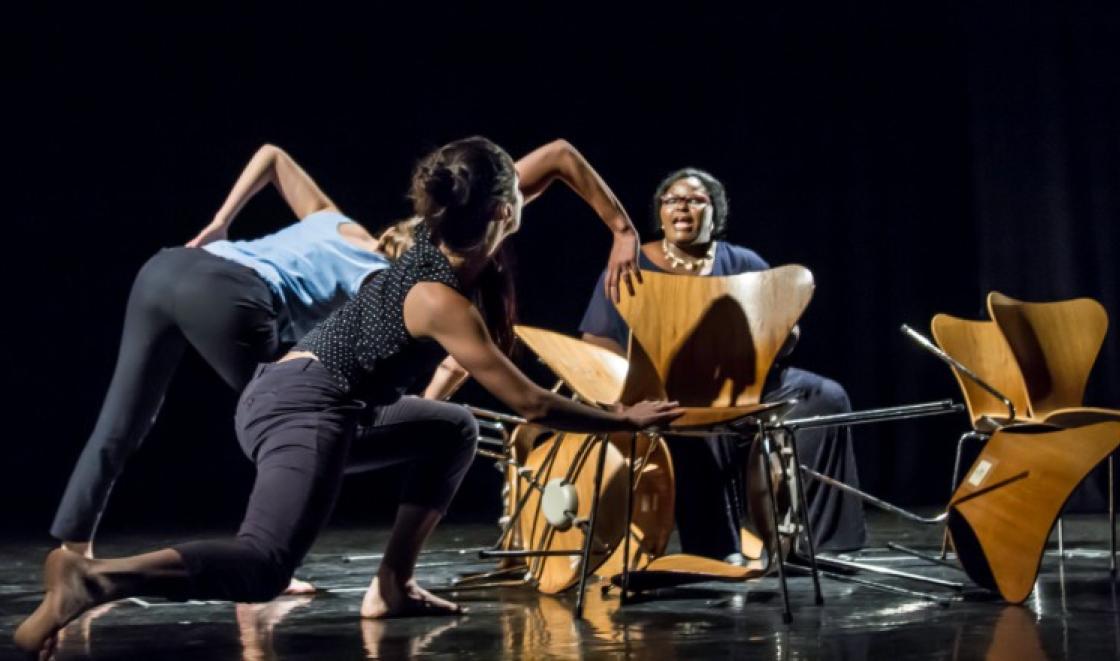Photo: Rosetta Life's Stroke Odysseys © Pari Naderi
The SHAPER programme focuses on addressing some of these limitations in the context of three conditions, namely postnatal depression (WP1), Parkinson's disease (WP2) and stroke (WP3). A fourth WP is focusing on evaluating the implementation of the arts driven interventions, as well as their cost-effectiveness (WP4).
The project aims to evaluate clinical, implementation and cost effectiveness (alongside clinical effectiveness) of three arts-driven interventions:
- Melodies for Mums, to address postnatal depression
- Dance for Parkinson's, to address Parkinson's disease
- Stroke Odusseys, to address stroke.
The SHAPER programme is focused on recruiting people across all three conditions across South London services, delivered by King's Health Partners.
How the study will be carried out
SHAPER will assess clinical, implementation and cost effectiveness. Implementation effectiveness refers to the uptake, suitability, acceptability and feasibility of the interventions. This analysis will support our understanding of how they can be successfully delivered within clinical pathways. This approach of assessing simultaneously clinical, implementation and cost effectiveness of an intervention is supported by the recently emerged in the literature ‘hybrid’ research designs – which offer a framework for these different elements of effectiveness to be assessed in parallel.
The evaluation of how the interventions are implemented within clinical pathways will further capture barriers and drivers of implementation, as well as unintended consequences for service users and providers. Existing implementation theory and direct work with a wide group of stakeholders of the interventions (again, including users, arts and clinical providers) will inform the implementation evaluation throughout the programme.
The cost effectiveness evaluation will cover health economic evaluations of the implementation and delivery costs and associated savings, service utilisation and related analyses. Implementation and cost data will be captured through a mixed-methods approach comprising a variety of qualitative and quantitative data collection techniques, including structured interviews and psychometrically established measurement scales.
Collaboration partners
The research team are based at King’s College, with the Centre of Implementation Science at the IoPPN who will work closely with UCL, King's College Hospital NHS FoundationTrust, Guy's ad St Thomas NHS Foundation Trust, Breathe Arts Health, the National Ballet and Rosetta Life.
Potential benefits of the study
The SHAPER programme aims to bridge the gap between small-scale arts interventions and their large-scale implementation into pathways within the NHS, for the improved treatment of both physical and mental health in people with postnatal depression, Parkinson’s disease and stroke. The evidence gathered in the SHAPER study will offer an invaluable resource to shape the future of arts interventions within the realm of rehabilitation for a range of other mental and physical health conditions. The SHAPER study is a unique opportunity to build a strong evidence-base on clinical effectiveness, implementation and mechanisms of arts interventions. This knowledge base could bring arts interventions into mainstream care, and on an equal footing with other pharmacological and psychosocial approaches
The study is funded by the Wellcome Trust. It was adopted by ARC South London in September 2020 and will be completed by September 2022.
Read more about the SHAPER programme


